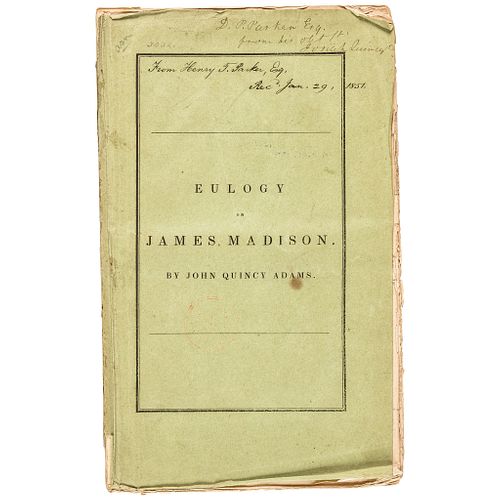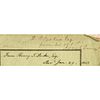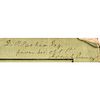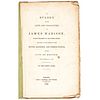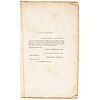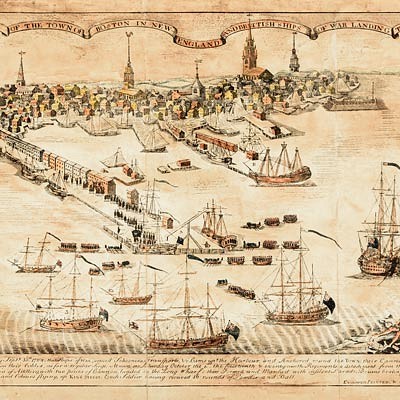(JOHN QUINCY ADAMS), An Eulogy on the Life and Character of James Madison, 1836
Lot 63
Categories
Estimate:
$600 - $800
Absentee vs Live bid
Two ways to bid:
- Leave a max absentee bid and the platform will bid on your behalf up to your maximum bid during the live auction.
- Bid live during the auction and your bids will be submitted real-time to the auctioneer.
Bid Increments
| Price | Bid Increment |
|---|---|
| $0 | $10 |
| $200 | $20 |
| $300 | $25 |
| $500 | $50 |
| $1,000 | $100 |
| $2,000 | $200 |
| $3,000 | $250 |
| $5,000 | $500 |
| $10,000 | $1,000 |
| $20,000 | $2,000 |
| $30,000 | $2,500 |
| $50,000 | $5,000 |
| $100,000 | $10,000 |
| $200,000 | $20,000 |
| $300,000 | $25,000 |
| $500,000 | $50,000 |
About Auction
By Early American History Auctions
Mar 20, 2021
Set Reminder
2021-03-20 12:00:00
2021-03-20 12:00:00
America/New_York
Bidsquare
Bidsquare : Autographs-Colonial-Political-Americana
https://www.bidsquare.com/auctions/early-american-history-auctions/autographs-colonial-political-americana-6509
330 Lots of Rare, Historic Autographs, Americana, Civil War Era, George Washington, Abraham Lincoln, Slavery & Black History, Revolutionary War Era, Colonial America, Federal Period, War of 1812, Colonial Currency, Indian Peace Medals & more... Early American History Auctions auctions@earlyamerican.com
330 Lots of Rare, Historic Autographs, Americana, Civil War Era, George Washington, Abraham Lincoln, Slavery & Black History, Revolutionary War Era, Colonial America, Federal Period, War of 1812, Colonial Currency, Indian Peace Medals & more... Early American History Auctions auctions@earlyamerican.com
- Lot Description
Autographs
Josiah Quincy's copy of John Quincy Adams the 6th U.S. President is Asked to Deliver a Eulogy in James Madison's Honor
JOSIAH QUINCY, III (1772-1864). U.S. educator and political figure, member of the U.S. House of Representatives (1805-1813), Mayor of Boston (1823-1828), and President of Harvard University (1829-1845). The historic Quincy Market in downtown Boston is named in his honor.
September 27, 1836, First Edition Imprint Cover Signed, "Josiah Quincy" titled, "An Eulogy on the Life and Character of James Madison", by Former President John Quincy Adams, 1836, Boston, printed by John H. Eastburn, Fine. This historic Eulogy Presented by John Quincy Adams, Boston, MA, 90 pages (complete), bound with string in the original paper covers, measuring 9.5" x 6" housed in an older green presentation case. Minimal foxing or tone, pages bound but never trimmed. Printed by John H. Eastburn, Boston. Slightly loose (but intact) binding. This eulogy was delivered at the request of the Mayor, Aldermen, and Common Council of the City of Boston. It is not just a recitation of the life of James Madison, the former 6th United States President, but it also includes a detauiled recounting of many of Madison's political contributions. In effect, it gives another view of the mind of this important Founding Father. The front cover includes two Handwritten notations:
1. This Eulogy presented as a Gift from Josiah Quincy to D.P. Parker, Esq., no date; and
2. The second written by Henry F. Parker, Esq. to an unknown recipient on January 29, 1851. Henry F. Parker was a noted dealer in furniture, feathers, mattresses, looking-glasses, carpetings, located at Nos. 4 & 6 Union Street, Boston in the mid 19th century.
Josiah Quincy was a Mayor of the City of Boston.
In 1798 Josiah Quincy III was appointed Boston Town Orator by the Board of Selectmen, and in 1800 he was elected to the School Committee. Quincy became a leader of the Federalist party in Massachusetts, was an unsuccessful candidate for the United States House of Representatives in 1800, and served in the Massachusetts Senate in 1804-5. He was elected a Fellow of the American Academy of Arts and Sciences in 1803.
From 1805 to 1813, he was a member of the United States House of Representatives where he was one of the small Federalist minority.
He attempted to secure the exemption of fishing vessels from the Embargo Act, urged the strengthening of the United States Navy, and vigorously opposed the admittance of Louisiana as a state in 1811. In this last matter he stated as his "deliberate opinion, that if this bill passes, the bonds of this Union are virtually dissolved; that the States that compose it are free from their moral obligations; and that, as it will be the right of all, so it will be the duty of some, to prepare definitely for a separation, amicably if they can, violently if they must." This was probably the first assertion of the right of secession on the floor of Congress. Quincy left Congress because he saw that the Federalist opposition was useless.
In 1812, Quincy was a founding member of the American Antiquarian Society. After leaving Congress, Quincy was a member of the Massachusetts Senate until 1820.
In 1821-22 he was a member and speaker of the Massachusetts House of Representatives. Quincy resigned from the legislature to become judge of the municipal court of Boston. Quincy was a candidate for Mayor of Boston in Boston's first election under a city charter, held on April 8, 1822. The votes of this first election were evenly split between Quincy and Harrison Gray Otis, with a few votes to others. Neither Quincy nor Otis had a majority, so neither was elected. They both withdrew their candidacies, and John Phillips was elected Boston's first mayor.
In 1823 Quincy was elected as the second mayor of Boston; he served six-one year terms from 1823 to 1828. During his terms as mayor Quincy Market was built, the fire and police departments were reorganized, and the city's care of the poor was systematized.
From 1829 to 1845, he was President of Harvard University, of which he had been an overseer since 1810, when the board was reorganized. At a time when college presidents were chosen for their intellectual achievements, Quincy's past experience as a politician and not an academic made him an unusual choice. He has been called "the great organizer of the university."
He gave an elective (or "voluntary") system an elaborate trial; introduced a system of marking (on the scale of 8) on which college rank and honors, formerly rather carelessly assigned, were based; first used courts of law to punish students who destroyed or damaged college property; and helped to reform the finances of the university. During his term Dane Hall (for law) was dedicated, Gore Hall was built, and the Astronomical Observatory was equipped. Quincy House, one of the university's twelve upperclass residential houses, is named for him.
In 1856 Josiah Quincy gave an address concerning the then upcoming American presidential election. Quincy endorsed the Republican candidate, John C. Fremont, and denounced how "for more than fifty years, the Slave States have subjugated the Free States." This speech is cited in "Negro President": Jefferson and the Slave Power, by Garry Wills.
His last years were spent principally on his farm in Quincy, Massachusetts, where he died on July 1, 1864
Our Auction Contents:
Black History & Slavery: (Lots 1 - 63)
Abraham Lincoln Related: (Lots 64 - 74)
Historic Autographs: (Lots 75 - 235)
Colonial America: (Lots 236 - 261)
Revolutionary War: (Lots 262 - 304)
George Washington Related: (Lots 305 - 306)
Early American Guns & Weapons: (Lots 307 - 318) - Shipping Info
-
Early American provides in-house worldwide shipping. Please contact us directly if you have questions about your specific shipping requirements.
-
- Buyer's Premium



 EUR
EUR CAD
CAD AUD
AUD GBP
GBP MXN
MXN HKD
HKD CNY
CNY MYR
MYR SEK
SEK SGD
SGD CHF
CHF THB
THB